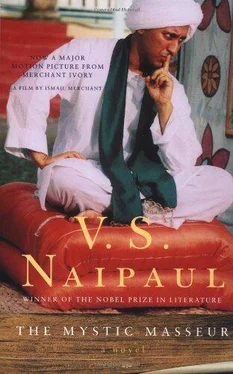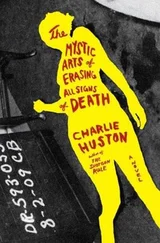Ganesh had never liked copy-books, since his school days; but the idea of note-books interested him. So he made another trip to San Fernando and explored the stationery department of one of the big stores in the High Street. It was a revelation. He had never before realized that paper could be so beautiful, that there were so many kinds of paper, so many colours, so many glorious smells. He stood still, marvelling and reverent, until he heard a woman’s voice.
‘Mister.’
He turned to see a fat woman, traces of white powder on her black face, wearing a dress of a most splendidly floriferous design.
‘Mister. How you selling the’ — she fished out a piece of paper from her purse and read from it — ‘Nelson Introductory reading-book?’
‘Me?’ Ganesh said in surprise. ‘I ain’t a seller here.’
She began to laugh all over the place. ‘Kee! Kee! Kyah! I did take you for the clurkist!’
And she went in search of the clerk, laughing and shaking and bending forward to hide her laughter.
Left alone, Garesh began taking surreptitious sniffs at the paper, and, closing his eyes, passed his hands over many papers, the better to savour their texture.
‘What you think you feeling?’
It was a boy, wearing a white shirt, a tie, unmistakable badge of authority, and blue serge shorts.
‘What you think you feeling? Yam or cassava in the market?’
Ganesh in a panic bought a ream of light blue paper.
Now, with the desire to write on his paper strong within him, he decided to have another look at Basdeo’s printing shop. He went to the narrow, sloping street and was surprised to find that the building he knew had been replaced by a new one, all glass and concrete. There was a new sign: ELITE ELECTRIC PRINTERY; and a slogan: When Better Printing is Printed We Will Print It. He heard the clatter of machinery and pressed his face against a glass window to look in. A man was sitting at a machine that looked like a huge typewriter. It was Basdeo, long-trousered, moustached, adult. There could be no doubt that he had risen in the world.
‘Got to write my book,’ Ganesh said aloud. ‘Got to.’
There were diversions, however. Presently he developed a passion for making note-books. When Leela complained he said, ‘Just making them now and putting them away. You never know when they go be useful.’ And he became a connoisseur of paper-smells. He told Beharry, ‘You know, I could just smell a book and tell how old it is.’ He always held that the book with the best smell was the Harrap’s French and English dictionary, a book he had bought, as he told Beharry, simply for the sake of its smell. But paper-smelling was only part of his new passion; and when he bribed a policeman at Princes Town to steal a stapling-machine from the Court House, his joy was complete.
In the beginning, filling the note-books was frankly a problem. At this time Ganesh was reading four, sometimes five, books a week; and as he read he scored a line, a sentence, or even an entire paragraph, in preparation for his Sunday. This had become for him a day of ritual and perfect joy. He got up early, bathed, did his puja , ate; then, while it was still cool, he went to Beharry’s. He and Beharry read the newspaper and talked, until Suruj Mooma pushed an angry head through the shop door and said, ‘Suruj Poopa, your mouth always open. If it ain’t eating, is talking. Well, talk done now. Is time to eat.’
Ganesh would take the hint and leave.
The least pleasant part of Sunday was that walk back to his own house. The sun was wicked and the lumps of crude asphalt on the road were soft and hot underfoot. Ganesh played with the idea of covering all Trinidad with a huge canvas canopy to keep out the sun and to collect the water when it rained. This thought occupied him until he got home. Then he ate, bathed again, put on his good Hindu clothes, dhoti, vest, and koortah , and attended to his note-books.
He brought out the whole pile from a drawer in the bedroom bureau and copied out the passages he had marked during the week. He had evolved a system of note-taking. It had appeared simple enough in the beginning — white paper for notes on Hinduism, light blue for religion in general, grey for history, and so on — but as time went on the system became hard to maintain and he had allowed it to lapse.
He never used any note-book to the end. In each he began with the best of intentions, writing in a fine, sloping hand, but by the time he had reached the third or fifth page he lost interest in the note-book, the handwriting became a hasty, tired squiggle, and the note-book was abandoned.
Leela complained about the waste. ‘You go make we all paupers. Just as Beharry making Suruj Mooma a pauper.’
‘Girl, what you know about these things? Is not a shop-sign I copying out here, you know. Is copying right enough, but it have a lot of thinking I doing at the same time.’
‘I getting too tired hearing you talking, talking. You say you come here to write your precious books. You say you come here to massage people. How much people you massage? How much book you write? How much money you make?’
The questions were rhetorical and all Ganesh could say was: ‘You see! You getting to be just like your father, talking like a lawyer.’
Then, in the course of a week’s reading, he came upon the perfect reply. He made a note of it there and then, and the next time Leela complained he said, ‘Look, shut up and listen.’
He hunted about among his books and note-books until he got a pea-green note-book marked Literature .
‘Just let me sit down, man, before you start reading.’
‘And when you listen don’t fall asleep. Is one of your nasty habits, you know, Leela.’
‘Can’t help it man. The moment you start reading to me you does make me feel sleepy. I know some people does feel sleepy the moment they see a bed.’
‘They is people with clean mind. But listen, girl. A man may turn over half a library to make one book . It ain’t me who make that up, you know.’
‘How I know you ain’t fooling me, just as how you did fool Pa?’
‘But why for I go want to fool you, girl?’
‘I ain’t the stupid little girl you did married, you know.’
And when he brought the book and revealed the quotation on the printed page, Leela fell silent in pure wonder. For however much she complained and however much she reviled him, she never ceased to marvel at this husband of hers who read pages of print, chapters of print, why, whole big books; this husband who, awake in bed at nights, spoke, as though it were nothing, of one day writing a book of his own and having it printed !
But it was hard for her when she went to her father’s, as she did on most of the more important holidays. Ramlogan had long ago come to regard Ganesh as a total loss and a crook besides. And then there was Soomintra to be faced. Soomintra had married a hardware merchant in San Fernando and she was rich. More than that, she looked rich. She was having child after child, and growing plump, matronly, and important. She had a son whom she had called Jawaharlal, after the Indian leader; and her daughter was called Sarojini, after the Indian poetess.
‘The third one, the one coming, if he is a boy, I go call him Motilal; if she is a girl I go call she Kamala.’
Admiration for the Nehru family couldn’t go much farther.
More and more Soomintra and her children looked out of place in Fourways. Ramlogan himself grew dingier and the shop grew dingier with him. Left alone, he seemed to have lost interest in housekeeping. The oilcloth on the table in the back room was worn, crinkled, and cut about; the flour sack hammock had become brown, the Chinese calendars fly-blown. Soomintra’s children wore clothes of increasing cost and fussiness, and they made more noise; but when they were about Ramlogan had time for no one else. He petted them and pampered them, but they soon made it clear that they considered his attempts at pampering elementary. They wanted more than a sugar-coated sweet from one of the jars in the shop. So Ramlogan gave them lollipops. Soomintra got plumper and looked richer, and it was a strain for Leela not to pay too much attention when Soomintra crooked her right arm and jangled her gold bracelets or when, with the licence of wealth, she complained she was tired and needed a holiday.
Читать дальше












